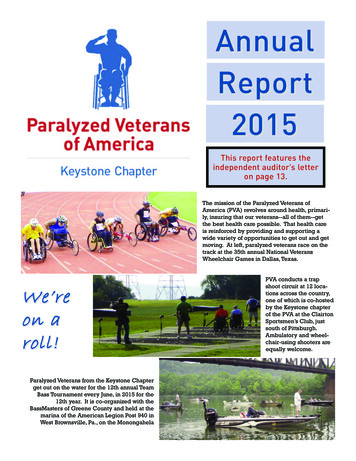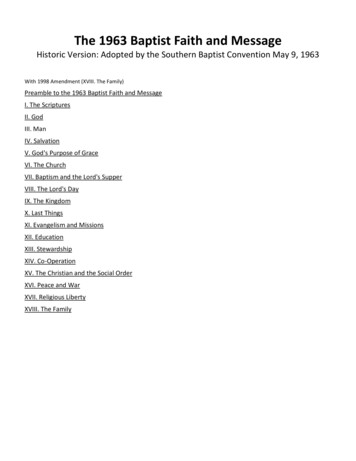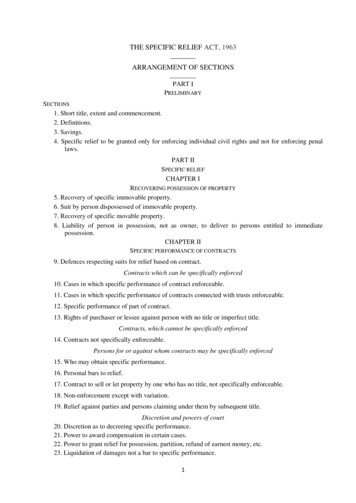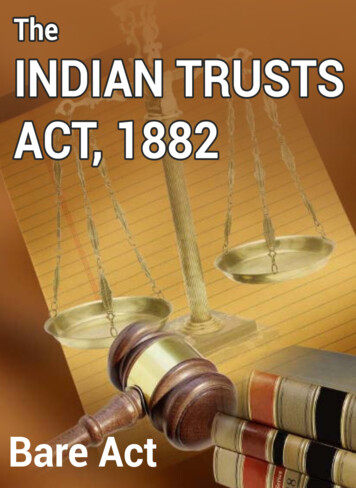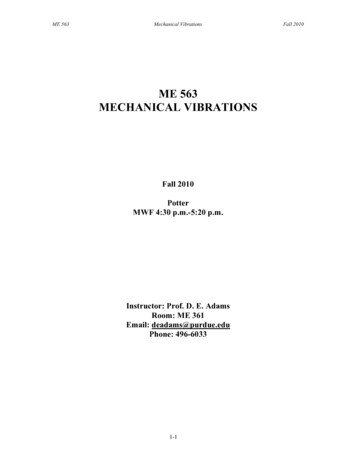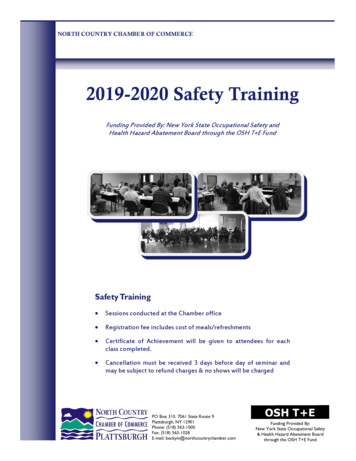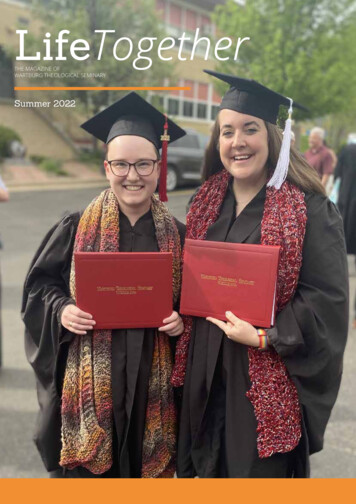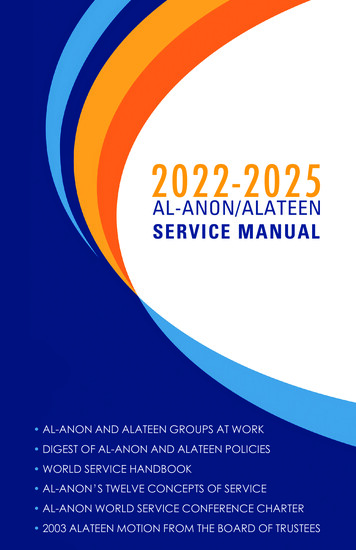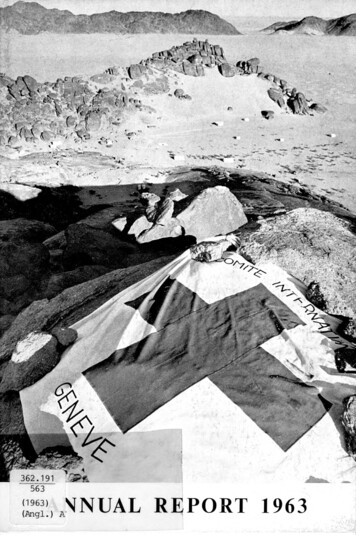
Transcription
563NNUAL R E P O R T 1963(1963)(A n g l. ) A'
It w as in the Y em en, a regionpreviouslyG enevauntouchedby theC onventions andtheRed C ross m ovem ent, that theIC R C conducted its m ost im portant action in 1963.
INTERNATIONAL COMMITTEE OF THE RED CROSSANNUALREPORT1963 GENEVA1964
BIBLIOTHEQUE DU CICR17, av. de la Paix,1211 GENEVEtél. 022/34 60 01 int. 2424Prêt limité à 1 moisProlongation possible PAR ECRITDATE DE RESTITUTION6 -6 5 2
IN T E R N A T IO N A L COM M ITTEE O F T H E R E D CROSS7, avenue de la P aix, G EN EV A , SwitzerlandPrinted in SwitzerlandThis R eport is published in French, English and Spanish (the Germ an edition is m imeographed
2-n.ni/(lù )INTERNATIONAL COMMITTEE OF THE RED CROSSANNUALREPORT1963GENEVA1964BIBLIOTHEQUE -C IC R13, AV. D e LA i-'AIX1202 GENEVE
INTERNA TIO NA L COMMITTEE OF T H E RED CROSSCommitteeL É O P O L D B O IS S IE R , D octor of Laws, H on o rary Professor a t th e U niversity of G eneva, for m er Secretary-G eneral to the In te r-P a rlia m e n ta ry U nion, President (m em ber since 1946)JA C Q U E S C H E N E V IÈ R E , H on. D octor of L iteratu re, Honorary Vice-President (1919)CARL J . B U R C K H A R D T , D octor of P hilosophy, form er Swiss M inister to F rance (1933)M A R TIN BO D M E R , H on. D octor of Philosophy, Vice-President (1940)tE R N E S T G L O O R, D octor (1945)PA U L R U E G G E R , form er Swiss M inister to I ta ly and the U nited K ingdom , M em ber ofth e P erm an en t C ourt of A rb itratio n (1948)RO D O LFO O L G IA T I, H on. D octor of Medicine, form er D irector of the Don Suisse (1949)M A R G U E R IT E VAN B E R C H E M , form er H ead of Section, C entral Prisoners of W arA gency (1951)F R É D É R IC S IO R D E T , L aw yer, Counsellor of the In te rn a tio n a l C om m ittee of th e RedCross 1943 to 1951, Vice-President (1951)G U ILL A U M E B O R D IE R , C ertificated E ngineer E .P .F ., M.B.A. H arv ard , B anker (1955)A D O L P H E F R A N C E S C H E T T I, D octor of Medicine, Professor of Clinical O phthalm ologya t G eneva U niversity (1958)HA NS BACHM ANN, D octor of Laws, A ssistant S ecretary-G eneral to the In te rn a tio n a lC om m ittee of the Red Cross from 1944 to 1946 (1958)JA CQ U ES FR E Y M O N D , D octor of L ite ra tu re , D irector of the G rad u ate In s titu te ofIn te rn a tio n a l S tudies, Professor a t the U niversity of G eneva (1959)D IE T R IC H S C H IN D L E R , D octor of Laws (1961)SAM U EL G O N A R D , form er Colonel Com m anding an A rm y Corps, form er Professora t th e F ederal Poly technical School (1961)HA NS M E U L I, D octor of Medicine, B rigade Colonel, form er D irector of the Swiss A rm yMedical Service (1961)M A R JO R IE D U V IL L A R D , D irectress of « Le Bon Secours » N ursing School (1961)MAX P E T IT P IE R R E , D octor of Laws, form er P resident of the Swiss C onfederation (1961)H on o rary M em bers :L U C IE O D IE R , Honorary Vice-President ; F R É D É R IC B A R B E Y an d PA U L C A R RY ,S U ZA N N EF E R R IÈ R E ,ÉDOUARDDEH A L LER , PAULLOGOZ,V A N N O TT I, A D O L F V IS C H E R .Directing StaffR O G E R G A L L O P IN , D octor of Laws, E xecutive D irectorJE A N S. P IC T E T , D octor of Laws, D irector for G eneral AffairsCLA UD E P IL L O U D , D ep u ty D irector for G eneral AffairsA LFR ED O
’cent a nsaus e r v ic edel ’h u m a n i t é”
THE RED CROSS CENTENARY POSTERby Hans Erni
PREFACE1963, the year of th e Centenary of the Red Cross, opened im m ediately after the Cuban crisis (November-December 1962).During the course of th a t crisis, the International Committee ofthe Red Cross was asked to play an im portant and new rôle byco-operating in the prevention of a nuclear war. Circumstances thusconfirmed the institution’s vitality a t a tim e when it was preparingto celebrate traditions a hundred years old.The interest of the Centenary was no doubt thereby muchenhanced. Furtherm ore, the commemorative events, howevervaried they were, in no way slowed down in Algeria, the Congo,the Yemen, Viet Nam and other places, the hum anitarian actionof the International Committee, a neutral interm ediary betweenthe parties to the conflict and distributor of relief to the victims.The present report gives an account of this day-to-day activityand also of the International Committee’s participation in theCongress, Exhibition and various events of the Red Cross Centenary.We have pleasure in including in this report a reproduction ofthe very attractive poster designed by the Swiss painter Hans Em iand presented by him to the Red Cross. This illustrates better thanany tex t the continuity of the Red Cross attitu d e through “ Ahundred years in the service of m ankind ”.
I. PRACTICAL ACTIVITIES1. AFRICANORTH AFRICAAlgeriaFollowing on the Evian Agreements (March 1962) and theestablishm ent of independence, the hum anitarian action, which theICRC had undertaken for seven years in Algeria, was continued inorder as far as possible to relieve the suffering, subsisting as aresult of the conflict, in spite of the cessation of hostilities.This relief action of the ICRC concerned prisoners of the twoadverse forces, regrouped populations, missing persons and former“ harkis ”, or Algerian m ilitary having served as auxiliary forcesin the French army.In the first two cases the ICRC was able to complete its workof aid before the end of the year.This was not so as regards the last two cases. By the endof 1962, enquiries opened concerning 594 French, of whom 330m ilitary and 264 civilians, presumed to have been captured by theFLN had not yet been resolved. Furtherm ore, ICRC delegates, inspite of repeated requests, were never able to visit “ harkis ”detained in Algeria.In February 1963, the ICRC charged one of its Vice-Presidents,Mr. S. Gonard, former Corps Commander in the Swiss Federal Army,with proceeding to Algiers with a view to coming to an under standing with the Algerian Government regarding the possibilityof the ICRC searching for persons missing since March 19, 1962 and9
coming to the aid of private individuals emprisoned as a result ofthe events and still detained in Algeria.The ICRC representative had several talks with Mr. Ben Bella,President of the Algerian Republic and with various members of itsCouncil of Ministers. On the conclusion of these talks, an agreementwas signed between the ICRC and the Algerian Government, accord ing to which the latter undertook to give all facilities to the dele gates of the International Committee for any hum anitarian aid itm ight wish to effect. This agreement was substantially strengthenedby the conclusion of negotiations between the French and AlgerianGovernments on the subject.Before leaving Algiers, Mr. Gonard visited the prison of MaisonCarrée where he spoke freely w ith a num ber of detainees. On hisproposal, the Algerian Government ordered the release of 111detained persons.Since the middle of March, a special ICRC mission, headed byMr. Claude Pilloud, D eputy Director for General Affairs, startedwork in Algeria on the basis of the agreement negotiated byMr. Gonard. This mission consisted of some tw enty members,including Mr. Roger Vust, perm anent delegate in Algeria, andMr. Jacques de Heller, ICRC delegate, both of whom had beenassociated with the negotiations agreement.Searches for missing persons were extrem ely difficult, especiallyas they were only started nearly one year after the events duringwhich disappearances had taken place. Although operating per sonally in those areas in which the missing persons had been reportedfor the last time, the delegates of the ICRC were unable, in abouthalf the cases, to collect any conclusive inform ation as regards thefate of the persons being sought, in spite of repeated approaches toall civil and m ilitary authorities and of the facilities which had beengiven them by the government.As regards “ harkis ”, the ICRC mission had no difficulty inobtaining permission to visit those detained in prisons. On the otherhand, the ICRC delegates were not able, generally speaking, tovisit former “ harkis ” held in m ilitary camps.Mr. Gonard returned to Algiers in June to make contact oncemore with Mr. Ben Bella and obtain confirmation of governmentsupport of the ICRC special mission.10
After Mr. Pilloud's departure, this mission was directed byMr. B ertrand de Haller, then tem porarily by Mr. Georg Hoffmann,general delegate of the ICRC in Sub-Equatorial Africa, detachedto Algiers in July, and finally by Mr. G. Marti.The ICRC delegates continued their investigations throughoutthe country, questioning local authorities, police officials, parents,neighbours and witnesses of the events during which persons beingsought had disappeared. They also made system atic visits to penalestablishm ents and other places of detention. Inform ation thusreceived was checked in Algiers by a bureau of the InternationalCom m ittee’s Central Tracing Agency, from which individual reportswere then made and sent to the appropriate French authorities fortransmission to the families concerned.In the m ajority of cases, an enquiry was usually concluded bydeath or in a strong presum ption of death. Only a small num ber ofthe missing were actually found alive. This applied to persons whosetrace had been lost after the hurried repatriation of large numbersof French established in Algeria or to those who had tem porarilyleft their homes during the troubles.As regards aid to the harkis, the ICRC delegation succeeded inobtaining some releases. In addition, it lent its good offices for thenegotiation of an agreement between the Algerian and FrenchGovernments concerning the admission to France of all formerharkis who wished to leave Algeria.Harkis detained in civil prisons were all visited by the delegatesof the ICRC, who were able to talk with each of them withoutwitnesses. Out of a total of 2,500 harkis visited, about 1,300 expres sed the desire to be transferred to France.The ICRC term inated its mission in September leaving it to theAlgerian Red Crescent to settle outstanding questions concerningmissing persons.As p art of the assistance programme to the Algerian populationcarried out by the League of Red Cross Societies and the AlgerianRed Crescent, the ICRC delegation in Algiers handed ten tons offull-cream powdered milk to the Algerian Red Crescent. This reliefconsignm ent had been placed a t the disposal of the ICRC by theSwiss Government from surplus dairy stock.11
MoroccoA dispute having arisen between Morocco and Algeria over thedem arcation of their common frontier in the Sahara, there resulteda period of acute tension which, without degenerating into a generalconflict, nevertheless led to the outbreak of fighting along thefrontier. During the m onths which followed, the ICRC concerneditself w ith aiding prisoners of both sides.Thus in December, Mr. Jean-Jacques Muralti, delegate, went toMorocco and visited more than 300 Algerian m ilitary captured byMoroccan troops. He distributed relief parcels to them containingunderclothes, toilet articles, games and cigarettes to a value ofabout 9,000 Sw.frs. The prisoners were able to write to their familiesthrough the interm ediary of the ICRC which transm itted to theAlgerian Red Crescent messages the delegate had collected duringhis visits.On October 31, the crew of the cargo vessel " Hasiblal ”, flyingthe Moroccan flag, was halted and impounded in the port ofNemours in Algeria. The ICRC im m ediately approached theAlgerian Red Crescent in order to be in a position to communicatenews of these men to their families.EQUATORIAL AND SOUTHERN AFRICAGeneral delegation of the ICRC in Equatorial and Southern AfricaAt the beginning of the year, the ICRC decided to establish ageneral delegation in th a t area, whose sphere of activity wouldcomprise the Congo-Leopoldville (including Katanga), Rwanda,Burundi, Uganda, Kenya, Zanzibar, Tanganyika, Angola, Mozam bique, Federation of Rhodesia and Nyasaland, Madagascar, theRepublic of South Africa (including S.W. Africa), Basutoland,Bechuanaland and Swaziland, Réunion, Mauritius, Archipelago ofComoro, and Seychelles. I t entrusted its direction to Mr. GeorgHoffmann who set up his headquarters in Salisbury (SouthernRhodesia) on Jan u ary 11.In broad outline, the object of Mr. Hoffmann’s mission was toestablish and m aintain direct contact with government authorities12
and the National Red Cross Societies of those different countrieswith a view to assisting in the dissemination of the Geneva Con ventions and, if necessary, to see to their application and to facili tate the eventual form ation and development of National Red CrossSocieties.The general delegate of the ICRC also found himself entrustedwith the task of carrying out, with the help of the regional delegates,all hum anitarian action in accordance with the principles of theRed Cross and especially th a t of protecting and assisting m ilitaryand civilian victims in arm ed conflicts or internal disturbances.CongoFresh troubles having broken out in K atanga in December 1962,Mr. G. C. Senn, regional delegate, went to Elisabethville in order toassure, in agreement with the U nited Nations forces, the action ofthe K atanga Red Cross and to avoid a repetition of the tragedywhich in the previous year had caused the death of G. Olivet,delegate of the ICRC, and of two associate members of the localRed Cross organization. Passes were issued to the ambulance driversand the necessary instructions given to the commanders of road blocks.On Jan u ary 3, Mr. Senn again approached the authorities res ponsible for the maintenance of order with a view to facilitating thereturn home of refugees who were on the roads leading to Rhodesia.The ICRC had in fact obtained the Rhodesian Red Cross’ contributionto the supplying of the civilian population on the Rhodesian frontier.Mr. Senn also attem pted to m aintain, as far as this was possible,co-operation between UN forces, the K atanga Red Cross and theSouthern Rhodesia branch of the British Red Cross, in order toassist and supply refugees in th at frontier area. Under the auspicesof the ICRC, convoys were able to ensure the return of refugees totheir homes.At the end of January, the general delegate of the ICRC obtainedpermission to visit in the prisons of Kolwezi and Kasapa, prisonerstaken by the K atanga forces during their withdrawal. He succeededin securing the release of 24 detainees, of whom 15 were m ilitaryand 9 civilians.13
In February, Mr. Hoffmann made contact with the Congoleseauthorities and the directors of the Red Cross, as a result of which,Mrs. J. Egger, regional delegate, received authorization to visitN ’Dolo prison, near the capital, in which notably several formermembers of the South Kasai Government were detained. On a visitto the same prison two m onths later, Mrs. Egger was able toobserve th a t, following her repeated representations, all K atangam ilitary and civilians, as well as two leading political personalitiesof South Kasai, had been released. She also secured the release ofsix European m ilitary personnel in the service of K atanga who hadbeen detained by UN forces.At the end of April, Mr. Senn visited the central prison of Luluabourg in which about 200 prisoners were in detention. He also sawthe prisons in the area and discovered the needs of the populationsstricken by the events.In Stanleyville, Mr. Senn visited the central prison and also th atof Kongo. On May 14, he secured the release of 102 K atanga gen darmes who had been incarcerated in the latte r prison.BurundiIn September, Mr. Senn went to Burundi in order to becomeacquainted with the general situation, and to visit detainees in thethree prisons of Usumbura, Kitega and Rumonge.He was everywhere given permission to talk without witnesseswith the prisoners and at the end of these visits, he intervened withthe authorities in order to improve the conditions of detention.AngolaDuring his tour in Angola from Ju ly 10 to 15, the general dele gate of the ICRC, Mr. Hoffmann, visited local branches of thePortuguese Red Cross at Luanda, Lobito and Mocamodès, Sa D a'Bandeira, Nova Lisboa, Carmona, Maquala da Zombo and Benguela.At Luso he paid a visit to the camp of former interned K atangam ilitary personnel, where his appearance was not of an officialcharacter. This tour enabled him to appreciate the activity beingdeployed by the Portuguese Red Cross, both in the training of14
first-aiders, as well as in aiding m ilitary wounded who receiveassistance from the “ Núcleo Auxiliar Féminine ”, a woman's,organization all of whose members are volunteers.South AfricaMr. Hoffmann has stayed in South Africa on five separateoccasions. He has established there most useful contacts with theSouth African Red Cross and Government and has obtained permis sion to visit certain persons detained by reason of the politicalsituation.He covered more than 36,000 miles by air, visiting not onlySouth Africa, Angola, Burundi and the Congo (Léopoldville), butalso Kenya, Madagascar, Mauritius, Mozambique, Uganda, N orth ern Rhodesia, South-W est Africa, Swaziland, Réunion, Tanganyika,N yasaland and Bechuanaland. In the main centres of these lastmentioned countries, he visited Red Cross Committees which assistyoung m others and infants and distribute food relief to children.These committees are all m ulti-racial and the interest taken in themby the African members is manifest.In all the countries through which he passed, Mr. Hoffmannmade contact with the authorities and existing Red Cross Societies,or those in the process of formation. The meetings he had borechiefly on the dissemination of the Geneva Conventions, thedevelopment of the new National Red Cross Societies and the pos sibility of visiting persons detained as a result of events.2. NEAR AND MIDDLE EASTYemenAn action of far-reaching significance.—The previous ICRCAnnual Report mentioned the sending, at the end of the year, of amission to the Yemen on account of the conflict which had justbroken out in th a t country. This mission, consisting of Dr. JeanMaurice Rubli and Dr. Guido Piderm an went to Saudi Arabia andto the Im am El Badr, Chief of the Royalist forces in the Yemen.During 1963, the ICRC was to considerably intensify its actionboth in the Arab Republic of the Yemen, of which Sanaa is the15
capital, as well as in the N orth of the country controlled by theRoyalist forces. I t set on foot im portant relief actions on behalf ofthe victims of th a t conflict.This intervention on the p art of the ICRC in the Arab Peninsulais indeed an im portant landm ark. In fact, until then, Saudi Arabiaand the Yemen were amongst the very few countries of the worldin which neither the Red Cross nor the Geneva Conventions hadever penetrated. Now one Red Crescent Society is being formed inthe Yemen and, as a result of ICRC missions, both President Sallaland the Im am El Badr have declared their willingness to respectthe principles of the Conventions.In this connection it can be seen th a t considerable progress hasalso been made in Saudi Arabia. The Saudi authorities in factencouraged the formation of a National Red Crescent Society inthe Kingdom, which was officially recognized by the ICRC onAugust 8, 1963. Saudi Arabia acceded to the Geneva Conventionson May 18, 1963.Missions to both sides.—During their enquiry in N orth Yemen,Dr. Rubli and Dr. Piderm an reached the Im am El-B adr’s GHQ,where they received a warm welcome and were assured th at thetroops would receive orders to apply the m ain provisions of theGeneva Conventions concerning treatm ent of the wounded andprisoners of war. The delegates’ investigations confirmed theblackest impressions as to the distress of war victims and the totalabsence of medical care in the areas held by the Royalist forces.As there was not even a nurse a t the Im am ’s H eadquarters,they immediately tended m any of the wounded and sick andoperated on some of them. During an air raid, Dr. Piderm an him self was slightly wounded, but after a quick dressing he was ableto tu rn his attention to others who were more seriously injured.The two doctors had scarcely returned to Geneva when anotherICRC mission set out for the Yemen, b ut this tim e on the Repub lican side. They found an equally enthusiastic and friendly welcomeawaiting them at Sanaa, capital of the Yemen Arab Republic.The President, Mr. Abdallah Sallal, received Mr. Roger DuPasquier and Mr. Joseph Gasser, the representatives of the ICRC,and pledged himself in writing to assure respect of the main rules16
laid down in the Geneva Conventions. He moreover agreed, inprinciple, to forward lists of prisoners made by the troops to Geneva.D uring their investigation into medical requirem ents, the ICRCdelegates visited the hospital of Sanaa, where there were somepolitical detainees undergoing treatm ent, in particular a formerMinister of the Royal Government.Representations on behalf of prisoners.—By the end of January1963, three m onths or so after the outbreak of hostilities in thisremote country, the ICRC had obtained a formal promise from theHigh Commands of both armies th a t the m ain provisions of theGeneva Conventions would be respected. I t remained to be seenhow these promises could be carried out in practice. Curiouslyenough, it soon appeared th at, despite their prim eval customs, thehum anitarian ideal often corresponded to a certain chivalry whichhad survived among the Yemeni.Nevertheless, a t times this hum anitarian ideal encounteredresistance. Some tribes showed little desire to respect their prisoners'lives. They considered it honourable to use their swords against the“ cowards ” who had let themselves be captured. A t this juncture,the Im am , convinced by the ICRC’s arguments, ordered them todeliver all captured enemies to him immediately—and alive. As anencouragement he offered a reward for every prisoner brought toGHQ alive.Other positive results were obtained through the ICRC dele gates’ negotiations. At the beginning of May 1963, 23 Egyptiansoldiers captured in the Yemen and interned in Saudi A rabia werefreed and repatriated, an ICRC delegate escorting them to Cairo.Further releases were to follow these a t the beginning of 1964.The ICRC delegate in Sanaa also assisted prisoners and interneesheld by the Republicans. While it was difficult to secure lists ofthese captives, at least authorisation was received to visit membersof the Im am ’s family and household, who were interned in thecapital. Similar visits were also made in Cairo, where, a t thebeginning of Ju ly 1963, two ICRC representatives were able tocontact members of the Yemeni former Royal family interned invillas. The UAR authorities later freed 24 of them, authorising themto leave for Saudi Arabia.17
These efforts on behalf of prisoners and internees have con tinued w ithout interruption on both sides and gained increasingsupport and understanding of both Republican and Royalistauthorities.Visits to E gyptian prisoners in often inaccessible regions some times proved daring expeditions ; they were however of greathum anitarian significance not only for the captives themselves butfor their families. Some of the grateful letters received by the ICRCare very moving and prove w hat consolation this activity brings toanguished families.Medical assistance on the Republican side.—The ICRC’s prelim inary missions had already revealed the total absence of health ser vices and medical staff throughout Royalist Yemen. While prepar ing to meet this situation, it had also taken stock of conditions onthe Republican side. Here its delegates had observed several goodhospitals, a t Sanaa and in other towns, which could accommodateand care for the wounded and sick. In addition, the Egyptian arm ypossessed a well-trained and equipped medical corps.While in Sanaa, the first mission to the Republican camp wasinformed of the shortage of medical supplies and m aterial for thesehospitals. A list of the articles urgently needed was handed to itby the Yemeni Minister of Health.In February 1963, the ICRC accordingly launched an appealfrom Geneva to several National Societies for the necessary relief.Their response perm itted the forwarding of large quantities ofmedicines and dressings to Sanaa, via Aden, which relieved thesituation both in the hospitals and the medical posts close to thefighting lines. Most of the supplies were distributed by Dr. JiirgBaer, medical delegate, and Mr. Joseph Gasser, delegate. By thesummer of 1963, the Yemeni Arab Republic had received gifts ofmedicines through the ICRC to the value of Sw.frs. 125,000.The beginnings of the Red Crescent at Sanaa.—During theirinitial hasty measures of reform, the leaders of the Yemeni Republicalso turned their attention to the health question. A Governmentdecree was issued instructing several competent personalities toorganize a National Red Crescent Society.18
W hen the ICRC delegation at Sanaa visited the Yemeni RedCrescent in its provisional quarters, it imm ediately saw th a t theleaders were eager to learn and equip themselves in order tomake their Society’s work more effective.The pitiful distress of the Royalist wounded.—From the beginningof the conflict, the ICRC delegates on the Royalist side had reportedthe disastrous medical situation in the ranks of the Im am 's forces.Almost all the men wounded during hard fighting in the heart ofthe m ountains died for lack of care. The growing vicissitudes of thewar made the situation constantly worse. The doctors sent fromGeneva, in particular Dr. Bruno Beretta, did their utm ost underprecarious conditions, and had to travel long distances on foot fromone site of b attle to another. They operated on the wounded in caveslighted with oil lamps or in the open air, and were overwhelmedwith work. In addition to the wounded in the lines, civilians pouredin from all sides to receive care. The Yemeni attributed unlim itedskill to the doctors. Transistors were even brought to them forrepair with the idea th a t electro-mechanics were a branch ofmedicine.In the summer of 1963, the ICRC felt it should m ake anothermedical survey. Accordingly, Dr. Jean Maurice Rubli, medical dele gate, was once more sent there in August, laden with severalthousand francs worth of medicines and medical equipment. Hisreports only confirmed the distress of the fallen com batants left tolie on the battlefield, not unlike those Henry D unant had witnessedat Solferino.The observations of two Swiss doctors.—Shortly afterwards, anew team of medical delegates, Drs. Edwin Spirgi and AnthonyWild, lent to the ICRC by the Swiss Red Cross, left for RoyalistYemen, where they made a very adventurous tour, which led todecisive conclusions. They travelled across the high plateau close tothe Saudi Arabian frontier, in sweltering heat and drought, andpenetrated into the interior of the country. Below are extracts froma Report sent to the ICRC a t the beginning of the autum n in 1963(starting where the two doctors had halted at a Royalist camp atthe beginning of their journey) :19
“ We gave a long drawn-out consultation, during which we treatedover 40 wounded and sick. Malaria is rife. Chronic dysentery andascaridiosis are also prevalent. There is malnutrition so far as caloriesare concerned. Food is composed of rice, dried mutton (very unappetis ing), a few vegetables and canned food, chiefly tunny fish.The following day we treated about 30 men. This involved theextraction of several badly decayed teeth for some of them. Theythanked us with a loud “ Hurrah ! ”Just before sundown we left the camp and struck out west, in asmall truck riddled with bullets, which drove us into the night.En route we found two badly wounded men in a cave. For fivedays they had been lying waiting for care on sheepskins stained withblood and pus, one half unconscious. There was practically no waterand needless to say no soap in this stenching hole. We administeredChloromycetin and arranged for their evacuation. In the Kharir oasiswe received a score of patients, some of them children, a little girl of 10with acute pneumonia, and a boy of 12 who was dying. We could onlytreat the latter symptomatically and ask for his evacuation to Najranand Djeddah.There is a crying need for a modem field hospital fully equippedfor diagnosis and therapy. This is becoming an obsession to us. We havein mind TB of the lungs, which spreads so quickly among the women,who are obliged to work like slaves, and the underfed children.Two days later we left the oasis astride donkeys. Mothers brought ustheir sick children as we travelled. All we could do was to distribute afew antibiotics, or ointment for those with trachoma.After 5 hours we reached a prisoner of war camp and cared forthe inmates. Then another consultation : 20 patients whom we treatedfor malaria, pneumonia, an open fracture of a finger, etc., a combatantwounded in the thorax by a sword. We distributed antibiotics anddressings ”.The following day, after crossing a 10,000 foot m ountain pass,the two doctors made a new halt. Their report continues:Our patients were waiting for us. They all wanted to come intoour tent at the same time. One man had a mutilated hand, anotherthe abdomen covered with scarifications. After having tended 40 caseswe took advantage of another bullet-riddled vehicle to continue ourjourney. On the way we again encountered two badly wounded men,who had been previously treated. They had stopped on the edge of a“ Wadi ” surrounded by their comrades. One of them died. They hadbeen carried for 10 hours.At night we journeyed through the desert towards the front. Wesaw places which had been bombarded. An officer authorised us to visit20
prisoners interned for the last five months. They sleep on the barerock in a cave, with their guards. Here again we distributed capturecards.We installed ourselves in a cave to receive the
at the Federal Poly technical School (1961) HANS MEULI, Doctor of Medicine, Brigade Colonel, former Director of the Swiss Army Medical Service (1961) MARJORIE DUVILLARD, Directress of « Le Bon Secours » Nursing School (1961) MAX PETITPIERRE, Doctor of Laws, former President of the Swiss Confederation (1961) Honorary Members :

